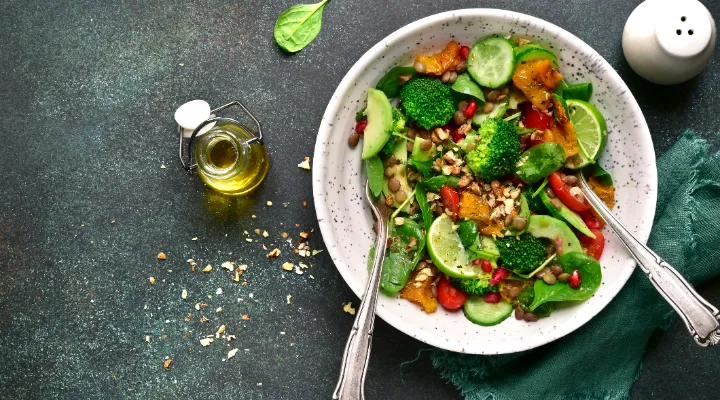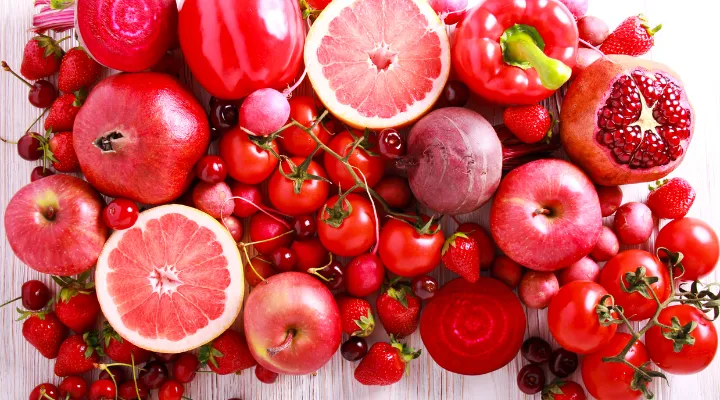You can get more specific vitamins (e.g., vitamins C, B1, B6, folic acid) and minerals (e.g., magnesium) into your body. High fiber, lower fat intake, and higher levels of other beneficial plant substances (e.g., polyphenols) can also characterize our diets. At the same time, plant food may contain less of some nutrients (e.g., protein, iron, vitamin B12) and more of others (e.g., absorption inhibitors and certain toxins).
The national OKOSTÁNYÉR® nutritional recommendation, or the Mediterranean diet, which has proven health benefits, recommends eating more plant foods and less meat. It is worth taking one meat-free day a week. Other days, animal foods should make up less than a quarter of your plate.
What should we look out for when following a vegan diet?
A vegan diet completely excludes foods of animal origin. A vegetarian diet, which includes eggs and dairy products, is more permissive.
Meat and fish are high in protein and absorbable iron. Dairy products are considered to be the best source of calcium. Eggs are an excellent source of many vitamins and minerals. Only food of animal origin contains vitamin B12.
A vegan diet, including fortified food and supplements, should be formulated to include adequate amounts of these nutrients where possible. This is no small task, and it is worth seeking professional help. Excluding food of animal origin is not recommended during pregnancy and breastfeeding. Furthermore, it requires particular expertise and support during childhood.
What are the sources of plant protein?
Legumes such as soybeans, beans, lentils, peas, and chickpeas have a high protein content similar to meat. Tofu made from soya is also a good source of protein. Cereals and food made from them are also high in protein.
However, the amino acids (protein elements) are more challenging to obtain from these plant sources. Our body needs 9 essential amino acids, which cannot be produced and must come from our diet. Food of animal origin is considered a complete source of protein because it contains all 9 amino acids. However, plants lack some of them. The good news is that the limiting amino acids in pulses and cereals are different, so combining them can provide all of them.
Oilseeds such as peanuts (which are actually legumes), walnuts, almonds, hazelnuts, cashews, and pumpkin seeds are also natural sources of protein. Including a daily portion (30g) of these in a vegan diet is worth it.
Is it worth choosing vegan meat substitutes?
Today, many vegan meat substitutes are available, with a variety of flavors and ingredients. It's worth checking the label. They can be low in protein, high in carbohydrates, and even sugar and fat, making them less healthy. Gluten-sensitive people should always check the label, as wheat protein is a common ingredient in these products. People with allergies or food sensitivities should also check the label carefully.
Choose the calcium and vitamin B12-fortified versions of plant-based meat substitutes, bars, drinks, and other products.
Some tips for a varied diet
Don't think of traditional lentil soup or vegan meat substitutes from the supermarket only. Pulses can also be used in meatballs, falafel, spreads, soups, and curries. You can also spice up flavors that may seem unfamiliar at first by adding a variety of seasonings and sauces. A smoked version of tofu is also available, which can be grilled or made into a casserole. You can also buy and make spreads from oilseeds, which can be consumed with bread, fruits, and muesli or can be components of sauces.
- pediatrics23
- dietetics22
- RMC Dental Center15
- diet15
- internal medicine11
- dentistry9
- pediatric dentistry8
- sport7
- Dr Kinga Jókay7
- coronavirus6
- screening6
- covid6
- urology6
- obstetrics gynecology6
- prevention5
- cardiology5
- allergy5
- psychology5
- dental hygiene5
- zsuzsanna kókai4
- infection4
- gastroenterology4
- menopause4
- screenings3
- Kinga Jókay M.D3
- Flu shot3
- Flu3
- women's screening3
- Dr Nóra Gullai2
- infectious disase medicine2
- Ear-Nose-Throat2
- heat stroke2
- endocrinology2
- Dr Tímea Baló2
- allergen immunotherapy2
- Adrienne Nagy M.D.2
- Fetal Medicine Center2
- pediatric urology2
- flu season2
- meningitis2
- dermatology2
- gynecologist2
- Ophthalmologist2
- Headache Clinic2
- Dr Eszter Bodnár2
- headache2
- menopause program2
- invisalign2
- diabetology2
- cardiovascular disease1
- diabetes1
- hydration1
- hematology1
- iron1
- Imre Bodó M.D.1
- Same Day Surgery Center1
- nutritional disorder1
- lyme disease1
- gynecologic oncology surgery1
- first trimester screening1
Our related doctors
Any questions before booking an appointment?
If you are unsure which doctor to see or what examination you require, we are here to help!
Simply request a free callback from one of our colleagues, who will help you find the right specialist based on your specific issue.







